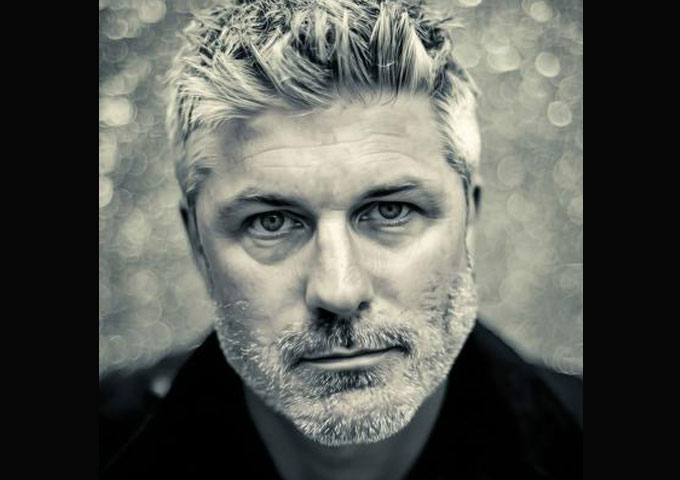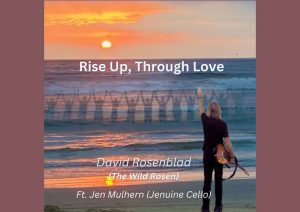From the icy expanse of Alaska, a genre-defying force known as Trapfly emerges, bridging the raw, unyielding energy of his Detroit origins with the expansive, untamed spirit of the wilderness. His sound is a deeply resonant tapestry woven from alternative rock, pop punk, synthwave, and metalcore, crafting an electrifying and profoundly emotionally charged experience. Trapfly‘s artistry lies in his ability to juxtapose soaring anthems with moments of intense introspection, delving into universal themes of resilience, unwavering devotion, and the intricate journey of self-discovery.
His latest magnum opus, Futropia, is not merely an album; it is a sprawling 12-song odyssey set to unfurl throughout 2026, with a new track revealing itself each month. The ambitious voyage commenced on April 4th with The Crown, a powerful declaration that immediately signaled a bold evolution in Trapfly‘s already diverse sound. This monthly release schedule is further enriched by companion albums set to drop throughout the year, offering listeners unique perspectives and deeper dives into the intricate sonic landscapes Trapfly meticulously constructs. It’s an innovative approach that promises an ongoing, evolving engagement with his artistic vision.
The latest jewel in the Futropia crown, and undoubtedly a track that will resonate deeply within the hearts of many, is the single “Perfect Moment” featuring James Asselin. This is a soaring pop ballad that masterfully blends the refined sheen of modern pop with the earthy, heartfelt storytelling prowess of Americana. It begins with a delicate intimacy, a gentle interplay of strumming acoustic guitars and twinkling pianos, beneath which a soulful lead vocal establishes an immediate connection. This tender opening steadily blossoms, building organically into a powerful chorus propelled by a steady, unwavering drumbeat. This dynamic ebb and flow cycles, each repetition embedding the ear-warming melody and heartfelt narrative deeper into the listener’s soul.
To truly grasp the profound emotional core of “Perfect Moment,” one must delve into its lyrical landscape. The initial lines, “All along I wish you knew / But I’m still afraid of you / Thoughts and feelings long awaited / Lead to us still separated,” immediately establish a palpable tension. There’s a longing for connection, a desire for unspoken truths to be known, yet it’s shadowed by a persistent fear, an internal barrier preventing full disclosure. This fear is not of the other person themselves, but perhaps of the vulnerability inherent in revealing one’s true self, the potential for rejection or misunderstanding. The weight of “thoughts and feelings long awaited” suggests a prolonged period of internal struggle, culminating in a continued state of emotional distance.
The narrative deepens with “Try to see the heart of me / Make a move and then you’ll see / That I’m afraid to be with you / And change the way I feel is true.” Here, the speaker yearns to be understood, to be seen beyond the surface. The invitation to “make a move” is a plea for the other person to bridge the gap, to take a step towards uncovering the hidden depths. The confession that “I’m afraid to be with you / And change the way I feel is true” is particularly poignant. It’s not a fear of the person, but a fear of the transformative power of a relationship, the potential for one’s established emotional equilibrium to be disrupted. This speaks to a common human dilemma: the comfort of the familiar, even if it’s isolating, versus the uncertainty and potential upheaval of true intimacy.
The recurring motif of “And the day is cold / But the night is colder / And I’m still aware / That we’re getting older” introduces a sense of temporal urgency and melancholic reflection. The coldness of the day and night could be a metaphor for the emotional chill that pervades their unspoken connection, or perhaps the growing distance between them. The awareness of “getting older” underscores the fleeting nature of time and the realization that opportunities for connection may dwindle. This realization often sparks a deeper longing for resolution.
The chorus, “You keep me waiting / Keep me waiting / Keep me waiting / For a perfect moment,” is the emotional anchor of the song. It speaks to the frustrating stagnation, the protracted anticipation for an ideal, perhaps unattainable, set of circumstances. It’s a universal sentiment of deferred desire, the longing for a sign, a moment of absolute clarity, that never seems to arrive. The repetition emphasizes the drawn-out nature of this emotional limbo.
“Time to carry on has passed / Never was this meant to last / I’m waiting in my reverie / But maybe it’s not only me” shifts the perspective slightly. There’s a hint of resignation, a recognition that the moment for true connection might have slipped away. The idea that “Never was this meant to last” suggests a preordained separation, or a fatalistic acceptance of their current state. Yet, the speaker remains “waiting in my reverie,” trapped in a hopeful delusion. The hopeful flicker comes with “But maybe it’s not only me,” hinting at the possibility that the other person might also be caught in the same cycle of anticipation and hesitation.
The following lines, “You’re afraid to let me go / Better hold the one you know / If we change the end could be / Or together could be free,” offer a profound insight into the other person’s perspective. It suggests that their hesitation stems from a fear of letting go of the familiar, a reluctance to venture into the unknown. The advice to “Better hold the one you know” is a poignant reflection on the comfort of established patterns, even if they are unfulfilling. The stark choice presented – “If we change the end could be / Or together could be free” – highlights the dichotomy between clinging to the known and embracing the transformative potential of change. True freedom, it suggests, lies in facing the unknown together. The return of the cold day/night imagery and the chorus reinforces the persistent emotional landscape and the ongoing struggle for a breakthrough.
Finally, the bridge, “The choice is made / I’ll take my chance / Tonight’s the night / For our last dance,” introduces a climactic turning point. The speaker has made a decision, a bold move to break the cycle of waiting. “Tonight’s the night / For our last dance” can be interpreted in multiple ways: a final attempt at connection before definitively moving on, or a decision to fully embrace the connection, allowing this “dance” to be a new beginning, a final, definitive step towards a shared future. The ambiguity adds to the emotional depth, leaving the listener to ponder the outcome of this pivotal moment.
“Perfect Moment” is more than just a song; it’s a tender, yet powerful, exploration of unspoken desires, profound fears, and the universal human quest for connection. It’s a testament to Trapfly’s lyrical prowess and his ability to craft narratives that resonate deeply with the human experience. With Futropia steadily unfolding, and tracks like “Perfect Moment” setting the bar, Trapfly is not just releasing music; he is crafting an immersive, evolving artistic journey that promises to captivate and inspire. Keep your ears attuned, for Trapfly is charting a course through uncharted musical territories, and the “perfect moment” to dive into his world is now.
OFFICIAL LINKS: X – SPOTIFY – INSTAGRAM – YOUTUBE –TIKTOK











More Stories
David Rosenblad Ignites a Compassionate Call to Action with “Rise Up, Through Love” ft. Jen Mulhern
Suzannah Finds Her Spin: An Emotional, Dizzying Debut with “Merry Go Round”
VALYEAR’s “AN INVITATION TO CHAOS” Turns Personal Collapse into Crushing Hard Rock Power